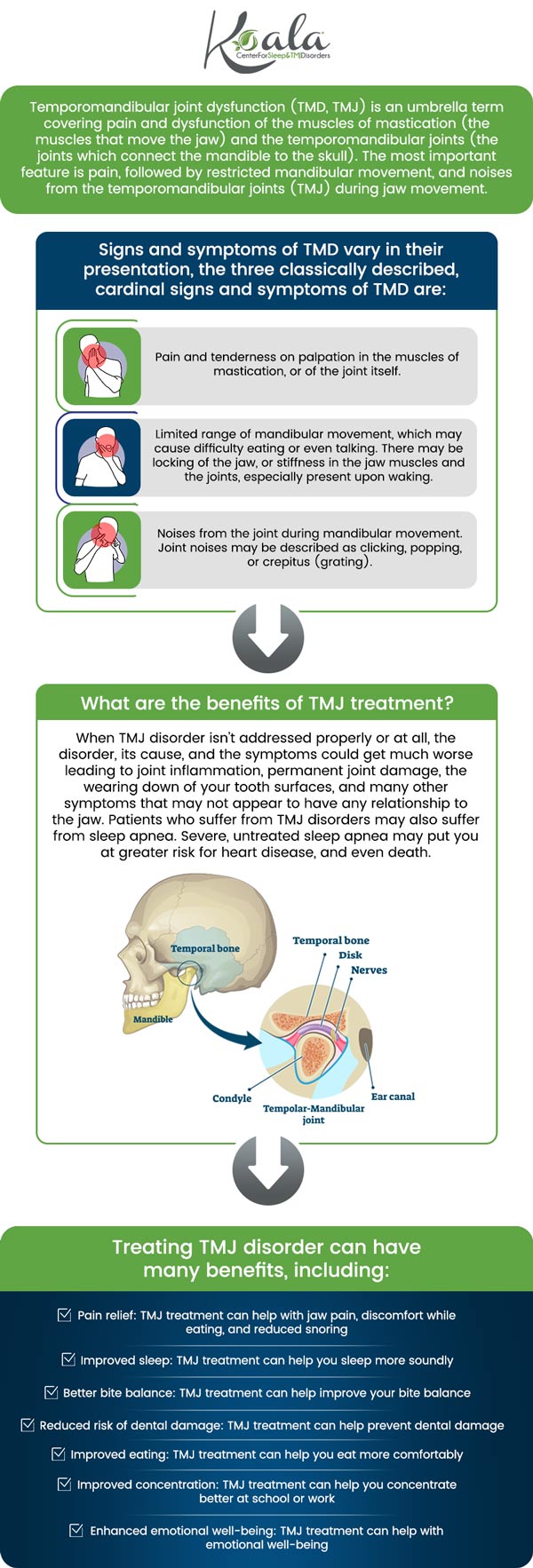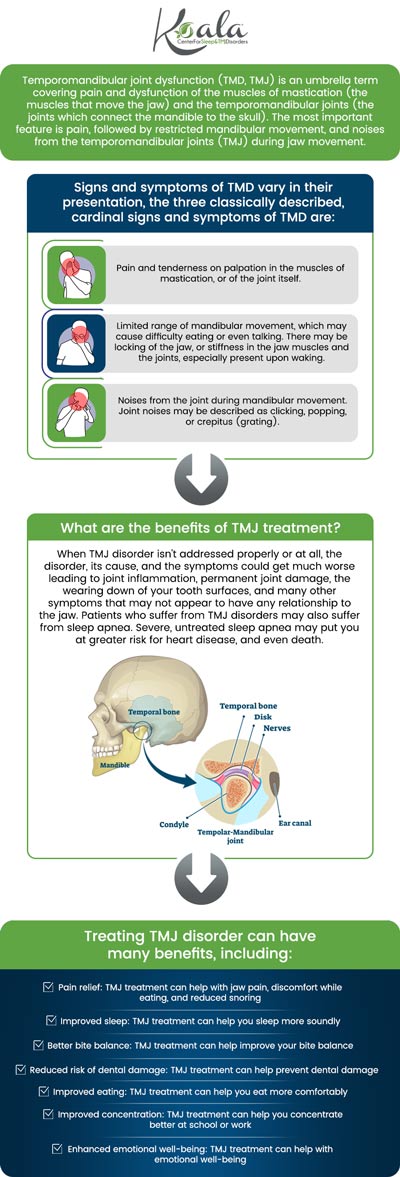What Are the Signs and Symptoms of TMJ?
There are many signs and symptoms of TMJ and treatments are available. Talk to our team of healthcare providers today at Koala Center For Sleep & TMJ Disorders about TMJ. For more information call us at one of our clinics today or request an appointment online. We serve patients from all over the USA. Locations in Bloomington IL, Peoria – Dunlap IL, El Paso TX, and Wausau WI.




Table of Contents:
What are the signs and symptoms of TMJ?
What is the main cause of TMJ?
What is a commonly experienced sign of temporomandibular joint disorder?
The most common signs and symptoms of a TMJ disorder are pain or tenderness of the jaw. Additional symptoms include pain in only one or both of the temporomandibular joints, an aching feeling in and around the ear, pain or difficulty when chewing, frequent headaches, aching facial pain, and difficulty opening or closing your mouth as a result of locking of the jaw joint. In some cases of TMJ disorders, a clicking sound can also be heard in the jaw when you chew or there is a grating sensation in the jaw when chewing or opening your mouth. The clicking of the jaw isn’t always indicative of a TMJ disorder though, if you aren’t experiencing any pain or limitation with the movement, then you probably aren’t experiencing a case of TMJ disorder and don’t require medical treatment. Some factors may put people at a higher risk of developing TMJ disorder and people who have experienced any of these should monitor themselves for symptoms of the condition. Factors include an injury to the jaw, some types of arthritis such as osteoarthritis or rheumatoid arthritis, chronic clenching of the jaw or grinding of the teeth, and some diseases of the body’s connective tissues that may impact the temporomandibular joint.
It can often be hard to pinpoint the cause of TMJ although the source of the pain is a dysfunction in the temporomandibular joint. What can cause the dysfunction or improper movement of the jaw can be hard to diagnose unless it can be tied directly to a significant event that impacted the jaw. The temporomandibular joint works through a combination of a sliding motion and hinge action. The movement is kept smooth by a small shock-absorbing disk that separates the cartilage that covers the bones of the joint. An accident or some type of injury to the jaw is one of the main causes of TMJ disorders as it can cause the temporomandibular joint to fall out of the proper alignment. Other causes include arthritis damage in the joint’s cartilage, erosion or misalignment of the disk separating the cartilage, clenching and grinding of the teeth, uneven bite possibly as the result of dental treatments like a crown or filling, excessively chewing gum, stress, and the use of orthodontic braces. The common thread through most of these causes ties back to either a misalignment of the jaw that impacts how it moves such as braces, dental work, or an injury, or overuse of the jaw through grinding, clenching, chewing, and stress.
There are several commonly experienced signs of a temporomandibular joint disorder but the most common one would be a pain in the jaw or the area surrounding the jaw that is being impacted by the TMJ disorder. The pain can be felt in several areas such as the muscles around the jaw joint, in front of the ear or in the temple area, headaches and migraines that are more frequent than normal, across the cheeks or as an overall aching facial pain, as well as toothaches, neck pain, and earaches that may appear before the TMJ disorder. The teeth may also feel tender causing pain to be experienced while chewing or causing the act of chewing to be more difficult. The jaw joint may also lock-up or the surrounding muscles may experience muscle spasms when opening and closing the mouth. In some cases, dizziness can occur in sudden bursts without warning and vertigo may be experienced when standing still, causing you to feel like the world is spinning, you are rocking back and forth, or you experience a sensation or rocking. Pain is never easy to deal with and it can affect your daily life in many ways, so contact our team of leading healthcare professionals today at Koala® Center For Sleep & TMJ Disorders. We help treat TMJ and we care about your health.

Additional Services You May Need
▸ KoalaKIDZzz®
▸ Sleep Apnea
▸ Snoring
▸ TMJ Disorder
▸ Fatigue
▸ Sleep Disorders
▸ Weight Loss
▸ CPAP Alternative
▸ Oral Appliances




